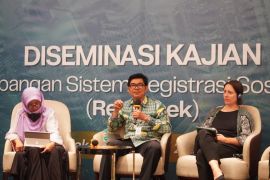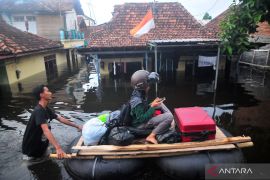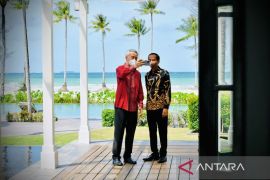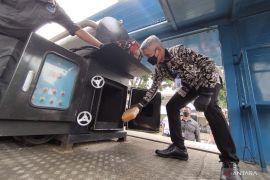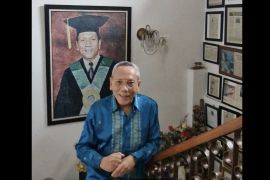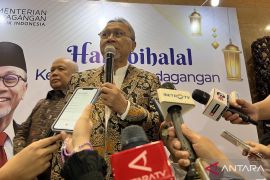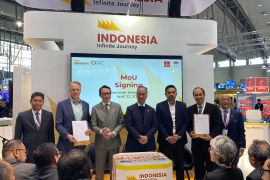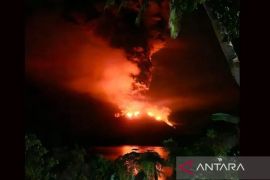He made the statement during an interview with Antara journalists on the sidelines of the ongoing Asia-Africa Conferences 60th anniversary commemoration at the State Palace here on Monday.
Following is the transcript of the interview.
Q: There have been some extraordinary regional crises in the Middle East as well as Africa. What chance do you see for Indonesias concepts to be heard in the AAC? We have heard about the Bandung message. Can you elaborate on it?
A: We indeed need a global balance. What we have seen so far are global injustices. It is true that 20 percent of the worlds population in rich countries use 70 percent of natural resources; so, a new order is needed that will balance the interests of all countries.
With regard to problems in the Middle East, we think the UN should act faster so that no country may use its forces to enter another country without a mandate from the UN.
In view of that, I think the UN needs reform so that all members can benefit from its existence.
Q: Can you elaborate on the UN reform?
A: I mean it is important that all countries benefit from its presence, and if problems need to be settled in a country, then a mandate may be sought from it.
Q: What about a right to veto?
A: Well, it is what I just said that a reformed order is needed because we have seen violence happening without a UN mandate. Countries that ignore the UNs existence. and I think the Asia-Africa Conference still owes six decades to the Palestinian people.
I think we must voice our support for the birth of a free Palestinian state and we will keep fighting along with them for it.
Q: For a global balance, these countries certainly will need strategic partnerships and will have to find a right model for it.
A: Tomorrow we will discuss it in a conference session. We do not want to step ahead, but again, it belongs to all countries and so they must talk what they really want. I think Indonesia needs to present the message as a large country and the worlds largest Muslim country that must indeed have the courage to speak up. However, once again, a dialog must be prioritized.
Q: What is the Indonesian concept?
A: We will be able to present it tomorrow only. The most important factor for us is regional stability, political as well as in terms of security, as that will boost the economic growth of a country and help promote regional economic growth as well as global economic growth. Security and political stability in a country are important for stability in an entire region. Without it, we will not be able to achieve good economic growth.
Q: This means ASEANs relation with regions is important.
A: We in ASEAN have always emphasized the need to ensure political and security stability for better growth as we have seen so far compared to other regions.
In terms of economy, connectivity between regions and between countries is also needed in view of two key factors, namely stability and infrastructure. If a country or a region manages to achieve these, I think it will be easier to boost their economic growth.
Q: Regarding stability. We have received threats from home and abroad.
A: It is possible. Factors threatening stability may be internal or external.
Q: Which one is more serious?
A: I think both are serious. In the present age, both can affect the economic growth of a country. No matter how good a country is, its stability may still be affected by an external factor.
Q: Can it be connected to terrorism, narcotics, threats of fundamentalism and others?
A: I think there are many of them. It can be the disruption of security or the spread of radical and extremist ideologies that almost all countries are now experiencing. Thank God we are seen as a country that has been able to overcome this problem through a different approach, which not only relies on security but also on cultural as well as religious aspects. That is what other countries always remember; that Indonesia as a moderate Muslim country that does not compromise on violence with regard to terrorism and extremism.
Q: So far, has radicalism been under control in Indonesia?
A: It has not only drawn the attention of the government but also of mass organizations. That is how it has been prevented. It is communities, mass organizations, moderate Islamic organizations such as NU and Muhammadiyah and others that have prevented it. I think we are lucky to have them. It would have been very difficult if only the state was involved in it. Role played by communities is determining.
Q: TNI (military) conducts exercise in Poso. Is this approach needed in a region that is considered to have the potential for radicalism to grow?
A: Wherever we see potential for an embryo of radicalism and extremism to grow we must take up this approach, which will later be followed by a religious approach. It must be allowed to grow.
Q: What about drug threats, process of the execution of drug convicts?
A: As I have repeatedly stated before, we will continue our war against drugs. There is no need to ask repeatedly when the death penalty will be carried out. There is a legal procedure that has not yet been implemented by the Attorney Generals Office. I will not meddle in it. The executor is the Attorney Generals Office and I think it is a matter of time.
Q: Isnt there any consideration, for instance, that Indonesian citizens are also under the threat of the death penalty abroad?
A: No, there isnt. This is their legal sovereignty. We have made every effort. And this is our legal sovereignty too.
Q: Is it ongoing?
A: True, we are trying (to free Indonesian citizens jailed abroad). I think the foreign minister have conducted several meetings. We sent a letter and prepared Rp2 billion in diyat (blood money). But if their law is different from ours, I think we must respect it. But the fact that we are still making efforts is true.
Q: How is the pressure from other countries and international agencies?
A: There is a lot of pressure from other countries and agencies but it will have no effect. We will remain firm.
Q: With regard to nine agenda (Nawacita) for the development of border regions such as Papua and local peoples preparedness to assist the government in infrastructure development, how does the government plan to give a chance to local businessmen to take part in it?
A: The process has started. It will be completed by the end of this year, both in Kalimantan and Papua. About the involvement of local businessmen, I think I have conveyed it for the umpteenth time not only to ministries but state-owned companies as well so there will be a balance in money circulation in regions.
But what is worth knowing is that the revised state budget (APBNP) was only endorsed in the middle of January. There is an administrative process and there is an auction process, so, programs such as the distribution of Indonesian health cards, Indonesian smart cards, and prosperous family cards may start only at the end of this month or early next month. The process started in the middle of this month and 21 million Indonesian smart cards and 88 million Indonesian health cards have just been distributed as the auction has just been completed.
About infrastructures in border areas, and infrastructures for toll roads, I think they all will be started early May.
In fact, they have just been started because the budget was endorsed only in the middle of January. So, if somebody asks where the Indonesian health cards and Indonesian smart cards are, the answer is that they were put to tender only in February and March. I think infrastructure development on a large scale will start in May. ***2**
(H-YH/S012/INE)
EDITED BY INE/a014
(T.H-YH/A/KR-BSR/A014) 20-04-2015 21:55:59
Editor: Fardah Assegaf
Copyright © ANTARA 2015
